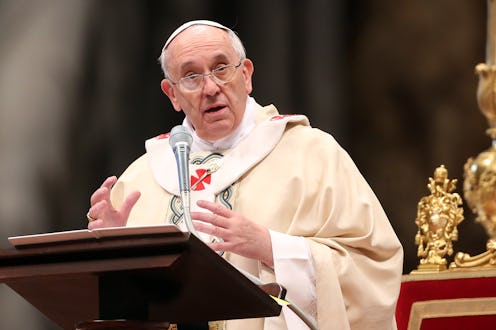News
Pope Francis: Armenian Killings Were "Genocide"
In a move clearly intended to provoke discussion, Pope Francis has denounced the mass killings of Armenians in Turkey as “the first genocide of the 20th century.” The pontiff also called for international recognition of the century-old slaughter of Armenians at the hands of Ottoman Turks as genocide, in comments that have elicited outrage in Turkey — which has consistently denied that a genocide occurred. The Vatican’s ambassador to Ankara was subsequently ordered to the foreign ministry to explain the pope’s remarks, according to The Guardian.
“Concealing or denying evil is like allowing a wound to keep bleeding without bandaging it,” Francis said Sunday, at the beginning of a special mass at the Vatican to mark the centenary of the killings. During the sermon he referred to “three massive and unprecedented tragedies.” Going on he said, “The first, which is widely considered the first genocide of the twentieth century, struck your own Armenian people.”
According to historians, up to 1.5 million Armenians were systematically killed as the Ottoman Empire fell in 1915. Several countries, including France, Germany and Italy, recognize the mass killing as genocide, but Turkey has long refused to do the same. In the wake of Francis’ inflammatory comments, the Turkish ministry has reportedly told the Vatican envoy it was “disappointed” by the sermon. BBC reports that the ministry went on to say that the comments had given rise to a “problem of trust” between Turkey and the Vatican.
Turkey has long insisted that the Armenian deaths were related to the civil war and widespread unrest, in which ethnic Turks also died, rather than to a systematic genocidal ambition. They also claim that the death toll has been dramatically inflated. The country has lobbied against other countries, including the United States, recognizing the killings as genocide. Officials have argued that labelling the killings as genocide will damage fledgling ties between Turkey and Armenia.
According to The New York Times, Francis is closely connected to the Armenian community, thanks to his origins in Argentina. He said his statement Sunday was necessary to fulfill his duty to honor the memory of the innocent people “senselessly” murdered by Ottoman forces. In a statement following the service, Francis asked that heads of state and international organizations recognize the events “without ceding to ambiguity or compromise.”
In further diplomatic fallout, Turkey’s ambassador to the Vatican cancelled a scheduled news conference Sunday. But others greeted Francis' words with gratitude. Aram I, the head of the Armenian Apostolic Church, thanked Francis for his denunciation of the killings, and emphasized that genocide was a crime against humanity, demanding redress. “International law spells out clearly that condemnation, recognition and reparation of a genocide are closely interconnected,” he said.
Several Armenian dignitaries, including the president and the head of the Armenian Apostolic church, attended the mass at the Vatican. Observers have noted that the ceremony indicates Francis’ willingness to place marginalized Christian groups at the center of the Catholic church. Igor Dorfmann-Lazarev, a researcher at the School of Oriental and African Studies in London, told The Guardian: “This is the first time that Armenia is the centre of attention of Catholic life and the Christian world. It’s meant to draw attention to the Christian east.”
The Christians of the east, especially the Middle East, are particularly embattled currently — making the Vatican’s relationship with Turkey, a relatively moderate Muslim-majority nation, even more important.
On the streets of Istanbul, reactions were mixed. Some respondents to Times reporters supported the pope’s statements, while others disagreed. “I don't support the word genocide being used by a great religious figure who has many followers,” said Mucahit Yucedal. “Genocide is a serious allegation.” As defined by the United Nations in 1948, genocide signifies killings and other violent acts intended to exterminate a national, ethnic, racial or religious group. The appellation nevertheless remains contentious.
Francis previously applied the term to the Armenian killings two years ago, according to the BBC, in an incident that also prompted protests in Turkey. Last year, Turkey’s then-prime minister Recep Tayyip Erdogan (now president) offered condolences to the descendants of the victims for the first time. But he said he would refuse to turn the issue into “a matter of political conflict.”
Images: Getty Images (3)
